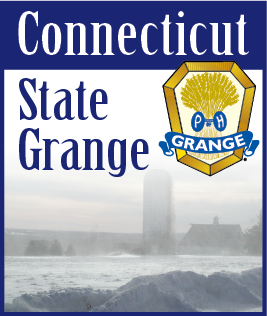| MARCH 12, 2010 -- Governor M. Jodi Rell today announced that $5 million, which will allow the state to add hundreds of acres of working farmland to ongoing preservation efforts, is expected to be approved when the state Bond Commission meets March 16.
"We continue to strengthen our agricultural base and, therefore our economy, when we preserve farmland for the next generation and beyond," Governor Rell said during a visit at the Bomba Farm in Seymour. "Supporting agriculture and the family farms that define this vital industry ensure we retain the ability to produce food and jobs. I am pleased and very proud that we can put more prime farmland in preservation."
Connecticut has the second oldest farmland preservation program in the country, preserving development rights of its first farm in 1979. The Governor said the state's goal is to preserve 130,000 acres of farmland with 85,000 acres dedicated to growing crops. To date, about 268 farms totaling 35,518 acres have been preserved or approved for preservation.
The 62-acre Bomba Farm, a former dairy operation, is in the process of selling its development rights to the state for $865,000 or $13,956 an acre. It is one of eight farms preserved in New Haven County and the first in the Town of Seymour. The farm currently raises beef cattle and hogs. Owned by siblings, Edward, Eugene and Anne Bomba, the farm has been a family operation since the early 1900s. The farm grows hay, flowers, herbs and a variety of vegetables including corn and gourds.
"The farmland preservation program offers families, such as the Bombas, an opportunity to preserve their legacy as well as their land," the Governor said. "The lure of development has been all too keen over the past several decades especially for farmers struggling with high production costs. Sadly, that the trade-off has turned pastures into parking lots. That will not happen under this program."
When the state purchases a farm's development rights, it places a permanent restriction on the use of the land. The land can never be used for non-agricultural purposes. The farms stay under private ownership and continue to pay local property taxes.
"Connecticut agriculture contributes $2 billion to the state's economy and will continue to be a viable sector of our economy thanks to programs like farmland preservation that has always had the support of Governor Rell," said state Department of Agriculture Commission F. Philip Prelli. "The demand for locally grown food continues to increase. When the Connecticut consumer buys locally, it keeps down transportation costs and keeps our farmers in business."
The state Department of Agriculture, which administers the program, reports there are currently 22 farms, comprising 2,000 acres, in the pipeline to be preserved this year. Additionally, 14 farms on 2,250 acres are either being appraised or under negotiation for preservation. The state program also includes partnerships with the federal Farm and Ranch Lands Protection Program (FRLPP) and the statewide agricultural land trust, Connecticut Farmland Trust (CFT).
In 2009, the state's Farmland Preservation Program:
- Preserved 10 farms of 1,370 acres in five counties
- Protected its 250th farm and first joint acquisition with FRLPP and CFT - Wisneske Farm in New London County
- Acquired development rights to one of the largest farms in the history of the program - 445 acre Thrall Farm in East Granby.
- Participated in two joint state-municipal projects that preserved farms in Granby and Pomfret
- Drafted criteria for pilot of Community Farms Preservation Program, to target smaller, locally important tracts
|
